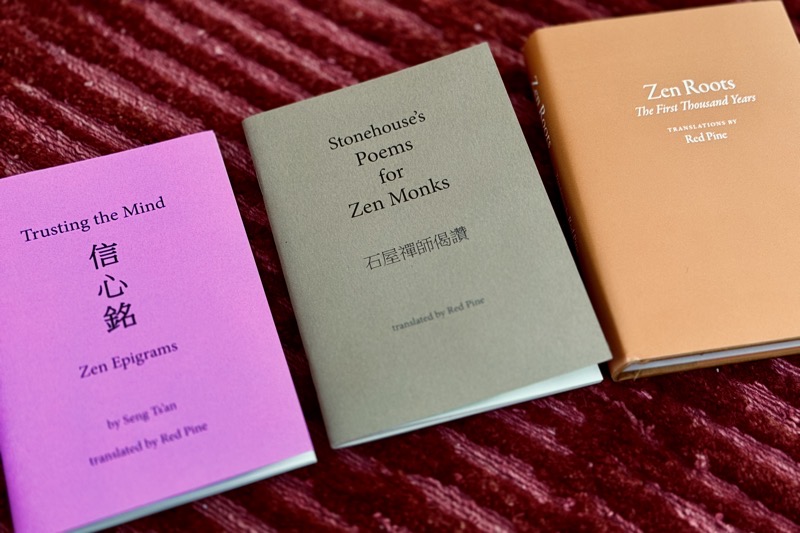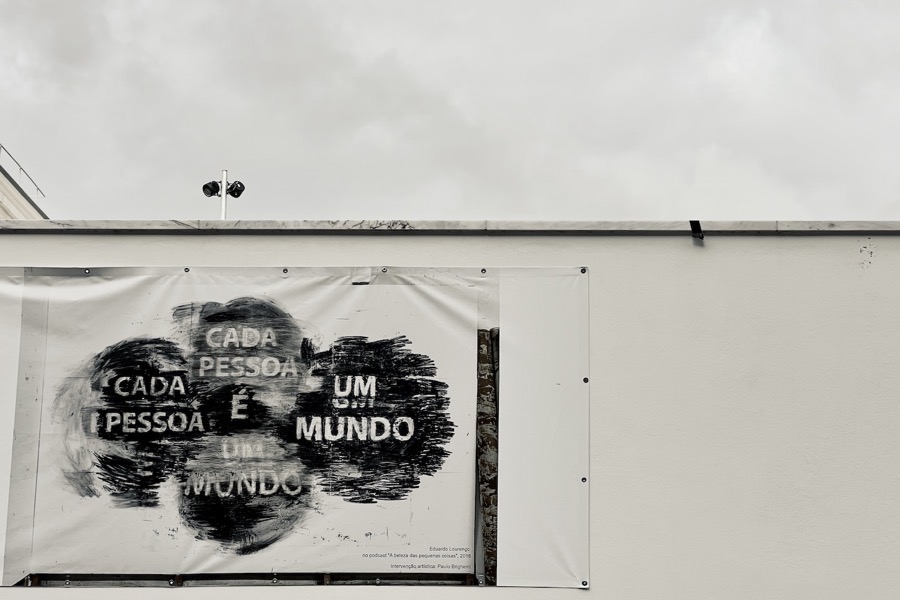02024-05-02 | Book, Zen
For years I have been reading books borrowed from the public library or e-books I bought, but last week I broke down and bought three real books when I discovered this publisher: Empty Bowl. I bought three translations from Chinese texts, by Red Pine (aka Bill Porter). They arrived yesterday and are most lovely editions. Except for Zen Roots these small books are not available as e-books.

By now I Ihave read Trusting the Mind, by Seng Ts’an, who was the third patriarch of Chan/Zen, twice already. I believe it shall travel with me for a long time, the way a book with the poetry of Ryokan used to.
02024-02-03 | Buddhism, History, Zen
The word Buddhism was only coined by Europeans in the last few hundred years. For two millennia Buddhists were simply known as people who followed the Dharma. The word Dharma, like many Sanskrit words, has a wide range of meanings and can’t be translated into a single English word. However, a general description that works well enough for this purpose is path. It’s a path or prescription that can be followed.
This meaning led to an interesting story when the Dharma arrived in China, because Tao means The Way. Some Taoists believed a story (early conspiracy theory!?) that claimed Laozi traveled east after writing the Tao Te Ching and taught a young man named Siddhartha about the Tao, which later came to be called the Dharma. It was suggested that the Dharma was built on the Tao or, to take the image of a path or road further, that the Dharma connected to the Tao. This is not at all likely but, like all good conspiracy theories, remotely possible. Siddhartha Gautama is said to have been born between 563 and 480 BCE and Laozi was born sometime between the 4th and 6th century BCE.
Something else happened, however… Dharma met Tao in China and became Chan and then Zen. Instead of extending the path into India, a new path was forged.
02023-04-24 | Philosophy, Zen
(repost from a year ago)
Today in 2006 I posted this:
Ichi-go ichi-e – Wikipedia, the free encyclopedia
Ichi-go ichi-e, literally ‘one time, one meeting’, is a Japanese term that describes a cultural concept often linked with famed tea master Sen no Rikyu. The term is often translated as ‘for this time only,’ ‘never again,’ or ‘one chance in a lifetime.’
Ichi-go ichi-e is linked with Zen Buddhism and concepts of transience. The term is particularly associated with the Japanese tea ceremony, and is often brushed onto scrolls which are hung in the tea room. In the context of tea ceremony, ichi-go ichi-e reminds participants that each tea meeting is unique.
No two meetings are the same. Each person is a world that is ever changing. Enjoy this meeting, because we won’t be the same next year, next month, next week, even tomorrow or this afternoon…

Photo of a poster in front of a school in Lisbon that says Cada Pessoa è um Mundo – Each Person is a World
02023-02-26 | Computer, Writing, Zen
I have this idea for a short story and it would be so meta if the short story was itself written by ChatGPT.
Write a short story in the style of Haruki Murakami, about a young man who goes to a zen temple to ask for instruction. He is taught meditation and receives a koan from the zen master. Instead of meditating with the koan, the young person queries ChatGPT and from it he receives a detailed response regarding the solution of the koan. The man represents this solution to the zen teacher as his own, who in turn gives him the next koan. And so on…
02022-08-28 | Meditation, Zen
Pico Iyer in The Art of Stillness: Adventures in Going Nowhere:
One evening — four in the morning, the end of December — Cohen took time out from his meditations to walk down to my cabin and try to explain what he was doing here.
Sitting still, he said with unexpected passion, was “the real deep entertainment” he had found in his sixty-one years on the planet. “Real profound and voluptuous and delicious entertainment. The real feast that is available within this activity.”
Was he kidding? Cohen is famous for his mischief and ironies.
He wasn’t, I realized as he went on. “What else would I be doing?” he asked. “Would I be starting a new marriage with a young woman and raising another family? Finding new drugs, buying more expensive wine? I don’t know. This seems to me the most luxurious and sumptuous response to the emptiness of my own existence.”
Typically lofty and pitiless words; living on such close terms with silence clearly hadn’t diminished his gift for golden sentences. But the words carried weight when coming from one who seemed to have tasted all the pleasures that the world has to offer.
and this quote, which I think nails it:
“Going nowhere, as Leonard would later emphasize for me, isn’t about turning your back on the world; it’s about stepping away now and then so that you can see the world more clearly and love it more deeply.”
Found here.
Yes, yes, so many yeses.




